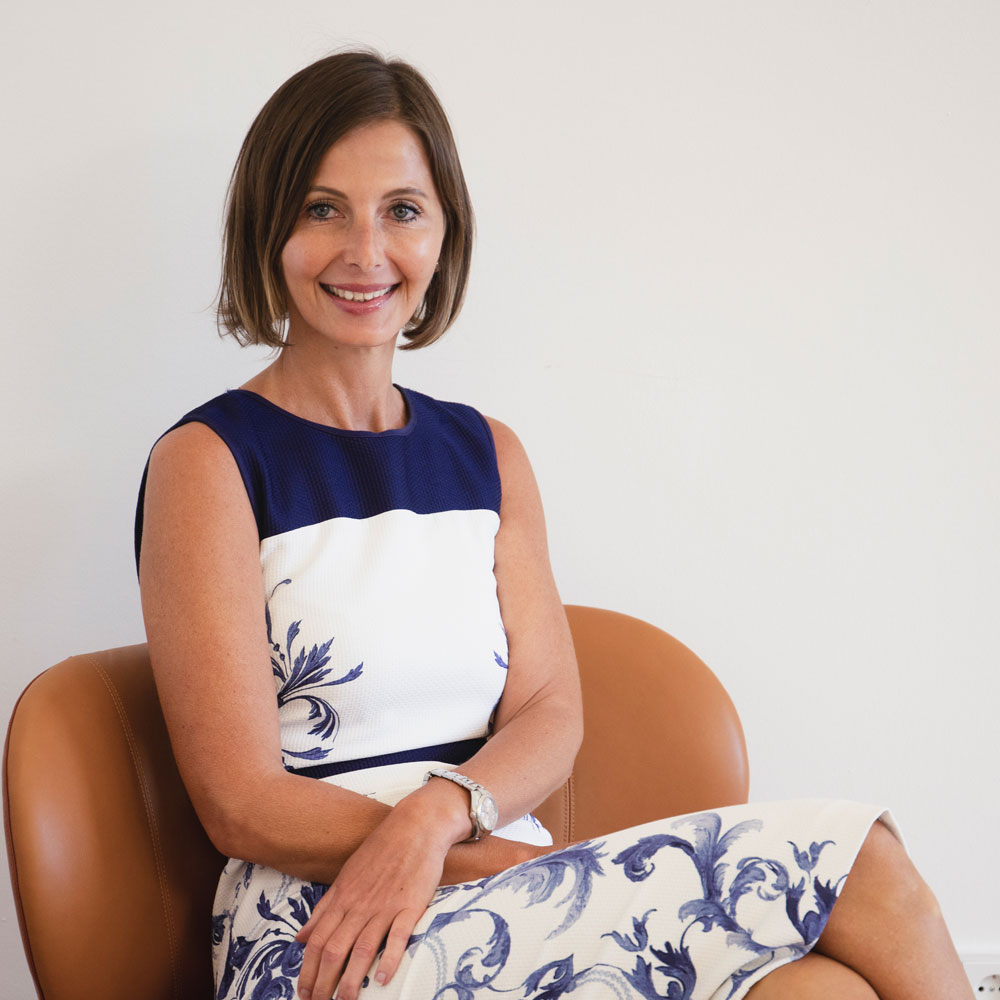Natural skin aging affects everyone and starts around the age of mid-twenties. It affects all layers of the skin and is particularly visible in the form of increasingly sagging skin on the face. One of the reasons for this is that collagen – the basis for young-looking skin – breaks down. But it is possible to boost its production again using certain methods. This allows the skin to gradually tighten again on its own. In this article, we will explain how collagen stimulation can be performed in our private practice for dermatology and aesthetics in Munich and what benefits you will gain from it.
What is collagen?
Collagen makes up nearly one-third of the proteins in the body, making it the most abundant protein there. It is a triple helix composed of amino acid chains. As a so-called structural protein, it forms strong fibers and has the task of giving shape and strength to body parts. Collagen is found, for example, in bones, cartilage and teeth. Above all, however, it shapes the tensile strength and elasticity of connective tissue.
Alongside ceramides, the Natural Moisturizing Factor (NMF; the skin’s natural moisturizing system) or hyaluronic acid, collagen is considered the “basis” of the skin. This structural protein has a decisive influence on the texture and appearance of the skin and is therefore a major contributor to its structure. It can account for up to 80 %.
What happens in the skin when there is a collagen deficiency?
Collagen is there to form a kind of scaffolding that stretches over the skin. It supports the skin and prevents wrinkles from forming. But as the years go by, the body cuts back on the production of collagen, causing the scaffold to become more unstable. If the collagen framework is weak, the skin loses tension. It sags and wrinkles appear. Facial lines become more pronounced, and the skin becomes drier.
When collagen loss occurs, the logical conclusion of many people is to add it back from the outside through creams, serums and collagen supplements. But does it really work?
How effective are cosmetics with collagen?
Some cosmetic manufacturers advertise that their serums and creams can boost the body’s own production of collagen. Unfortunately, this is not true in most cases. This is due to the fact that commercially available cosmetics do not reach deep enough into the skin layers to be able to work effectively in them. This is due to the size of the collagen molecules. They are simply too large to penetrate deeper. So, as a rule, the effect is limited to the epidermis.
In addition, the moisturizing and smoothing effect on this top layer of skin often lasts only as long as the cream is used. This means that there will be no long-term effect. If you discontinue the product in question, the superficial effect will also cease.
By the way: from a purely legal point of view, conventional cosmetics are not allowed to penetrate the skin that deeply at all, as the formulations would otherwise fall under the Medicines Act.
Supply collagen with food supplements?
In addition to cosmetics, there are now also numerous nutritional supplements with collagen on the market: drinking ampoules, powders, capsules, tablets … Here, too, the manufacturers promise great effects. According to them, the age-related degradation of collagen structures should be compensated by taking the means. The collagen is supposed to be channeled to the “defective” areas in the body and used as a building block for repair.
What sounds so good in theory is hardly true in practice: at the end of the day, collagens are proteins that – taken as a drink or tablet – are broken down into their constituent parts in the stomach or, at the latest, the small intestine. These small particles are amino acids such as glycine, lysine and proline. However, these are amino acids that are also present in a balanced diet and are nothing unusual in themselves. Whether the body produces complex collagens again from these individual components and places them in the right places in the body is questionable.
There are studies that confirm an improvement in skin elasticity and reduction in wrinkle depth by taking collagen supplements. However, the changes are usually so small that they are not visible to the naked eye.
Dr. Tatjana Pavicic
Dr. Tatjana Pavicic is a specialist in dermatology and venereology with her own practice in Munich. She is an internationally recognized expert in aesthetic dermatology with a special focus on dermocosmetics, botulinum toxin, fillers and lasers.
Collagen stimulation: effective measures of aesthetic dermatology
The effects achievable with treatments from aesthetic dermatology are quite different. Using various approaches, we are able to compensate for the loss of collagen and reactivate or increase its production. For this purpose, we offer the following treatments in our practice in Munich:
Collagen stimulation by radiofrequency: attiva
In the Attiva treatment, we insert a fine probe into your subcutaneous tissue. In the next step, we apply radiofrequency energy while treating the skin surface with lowered temperature. The energy penetrates the tissue to the deep layers and causes the lower skin layers to contract. At the same time, the mobile connective tissue cells are activated, which leads to new collagen formation.
For more information, please click here: Attiva Munich
Collagen stimulation by radio/ultrasound: btl exilis elite™.
In this treatment, we also work with heat. We guide the handpiece of the device over your skin with circular movements. Your surface heats up to 40 to 43 degrees Celsius, and at depth the temperature rises to about 45 degrees Celsius. The connective tissue cells are stimulated to produce new collagen. As a result, skin and connective tissue can become firmer.
More on this topic: BTL Exilis Elite™ Munich
Collagen stimulation through laser treatment
In the fractional laser procedure, we place a large number of microscopic heat columns in specific areas of your skin. Since there are untreated areas of skin in between, these ensure rapid healing. This is accompanied by the formation of fresh tissue and new collagen.
Ablative laser procedures also serve to activate collagen formation, among other things. Here we remove the superficial layers of skin. The resulting minimal wound triggers the production of fresh collagen and additional elastic fibers.
Skin improvement can also be achieved with non-ablative laser treatment. Here, the laser beams penetrate the uppermost layer of skin – but without ablating or damaging it. They thus reach the dermis, which consists mainly of connective tissue fibers. Needle-prick-like micro-injuries occur here. This drives the body to produce new cells and more collagen.
More information on the different procedures: Laser treatment Munich
Collagen stimulation with innovative dermal filler: radiesse®
Radiesse® makes it possible to rebuild lost volume in the face and replace it in a long-lasting manner. In addition, the filler improves your skin quality: it stimulates the body’s own production of collagen and elastin by activating the collagen-forming cells. Your skin structure is thus improved on the surface as well as in depth. The new collagen makes your skin more youthful, firmer and stronger.
More about: Radiesse® Munich
Collagen stimulation with ultrasound lifting: ultherapy
A lasting beauty tightening in the face, neck as well as in the area of your décolleté is made possible by the ultrasound treatment Ultherapy. The micro-focused ultrasound energy passes through the skin tissue. It acts at a depth of up to 4.5 mm – the layer of tissue that is tightened during a surgical facelift. The skin responds to this stimulation by producing tightening collagen and fresh elastin. This allows for a more rejuvenated and contoured appearance.
More information: Ultherapy Munich
Stimulate collagen formation in munich
Are you bothered by the fact that your skin is sagging and would you like to have the condition treated with lasting effect? We would be happy to see you in our practice. Depending on where and to what extent your skin is sagging, we will create a treatment plan tailored to your individual needs. Simply contact us!
Foto: © StudioVK / elements.envato.com

